







A Promise of Lenten Program 2025 Year C
03 Introduction - Bishop Anthony
04 How to Use this Booklet
05 Prayer of Saint John Chrysostom before reading the Scripture
Understanding Our Faith, Understanding Our ChurchFormation Themes:
06 Jubilee 2025: Pilgrims of Hope
06 Your Baptismal Priesthood
07 Living Synodality
08 First Sunday of Lent – 9 March 2025
14 Second Sunday of Lent – 16 March 2025
20 Third Sunday of Lent – 23 March 2025
26 Fourth Sunday of Lent – 30 March 2025
34 Fifth Sunday of Lent – 6 April 2025
40 Sixth Sunday of Lent, Palm Sunday – 13 April 2025
About The Liturgies of Holy Week & the Easter Triduum
48 Palm Sunday of the Passion of Our Lord
48 Chrism Mass
48 The Triduum
50 Easter Sunday
51 A Unified Easter across ALL the Christian Churches in 2025!
Bishop Anthony
Bishop Anthony
My dear brothers and sisters in Christ,
dear brothers and sisters in Christ,
As we now gather our hearts to embark on a journey together through this holy Season of Advent; a time of great preparation, anticipation, and hope in the impending birth of the child Jesus, we are profoundly reminded of the immense joy that awaits us.
In these coming weeks, may we lift our hearts in praise and thanksgiving to God the Father, who loved His people so much that He sent His only Son into the world so that we may come to know and follow Him.
As we now gather our hearts to embark on a journey together through this Season of Advent; a time of great preparation, anticipation, and hope impending birth of the child Jesus, we are profoundly reminded of the immense joy that awaits us.
In these coming weeks, may we lift our hearts in praise and thanksgiving the Father, who loved His people so much that He sent His only Son into the so that we may come to know and follow Him.
My dear sisters and brothers in Christ,
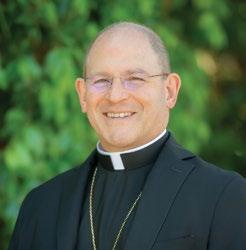
This First Sunday of Advent marks the beginning of a new liturgical year. A year of great significance and joy, with the commencement of the Jubilee 2025, Pilgrims of Hope. In proclaiming this year, the Holy Father, Pope Francis is reminding us that we are all pilgrims on this earth, caretakers of God’s creation, and united in our Mission to share the Good News of Jesus Christ.
This First Sunday of Advent marks the beginning of a new liturgical year. A great significance and joy, with the commencement of the Jubilee 2025, of Hope. In proclaiming this year, the Holy Father, Pope Francis is reminding that we are all pilgrims on this earth, caretakers of God’s creation, and united our Mission to share the Good News of Jesus Christ.
This Lent, as we journey together through this Holy Year, we are granted a unique opportunity to focus our hearts more intently on the theme of Hope. Significantly, this Jubilee year also ushers in a renewed spirit of ecumenical hope, as the liturgical calendars of the Catholic and Orthodox Churches align, culminating in the shared celebration of Easter on the same day.
As a people of Hope, may we welcome God into our everyday lives as we prepare to commemorate His sacred birth. May we listen to God’s Word to transform our hearts and lives as living disciples of Jesus Christ. May we all embark on the road to holiness through our expressions of prayer, reflection, and a renewed desire to be in the presence of the Lord.
As a people of Hope, may we welcome God into our everyday lives as we to commemorate His sacred birth. May we listen to God’s Word to transform hearts and lives as living disciples of Jesus Christ. May we all embark on the to holiness through our expressions of prayer, reflection, and a renewed desire be in the presence of the Lord.
Our Lenten resource this year invites you not only to reflect on the Sunday scriptures but also to engage with thought-provoking questions that encourage each of you to discern your own Baptismal calling. It is my prayer that this resource becomes a powerful experience of prayer with Scripture, opening the ears of your hearts to the Word of God, allowing it to become part of you and to transform your life.
I commend this 2024 Advent Program to you as a rich resource for renewal and revitalisation in your preparations. As Pilgrims of Hope, may your accompaniment of our Blessed Mother and Saint Joseph on their journey to Bethlehem bring you abundant grace and peace in the Lord.
I pray for each one of you, that this Lenten season may be a time of profound prayer and reflection, drawing you deeper into the Mission entrusted to us by Jesus, whose resurrection restores us all to communion with God, our heavenly Father.
I commend this 2024 Advent Program to you as a rich resource for renewal revitalisation in your preparations. As Pilgrims of Hope, may your accompaniment of our Blessed Mother and Saint Joseph on their journey to Bethlehem bring abundant grace and peace in the Lord.
Please be assured of my prayers for each of you throughout this Season of Advent.
Please be assured of my prayers for each of you throughout this Season of
Most Rev Anthony Randazzo DD JCL Bishop of Broken Bay
Most Rev Anthony Randazzo DD JCL
of Broken Bay
Bishop of Broken Bay
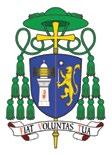
This booklet invites you to reflect prayerfully on the Sunday Gospel readings in Lent. It can be used individually or as part of a group. The notes below are provided for use in a small group context.
For each of the six weeks of Lent, this resource includes a reading of the Gospel text, a reflection on the text, and a personal testimony, along with reflection questions to guide discussion.
It is suggested that you allocate 1 ½ hours to complete each session, and the following process is recommended:


An Opening Prayer is offered, which may be read together by participants. Song suggestions are given for each week which you may wish to consider using as part of the gathering prayer time for the group.

To allow participants to prepare themselves well to hear God speak through the Sacred Scriptures, you may wish to pray the Prayer of Saint John Chrysostom prior to reading the Gospel text.
Listen to the Gospel text by inviting a participant from the group to read the text.
Pause for silent reflection for a few moments. Invite people to share one insight into what they are hearing through the text. This is not a time for discussion, but only an invitation to offer a short comment. The group listens attentively to each person but does not respond.

A reflection is offered on the scripture text, drawing out the themes of the Gospel.
Invite participants to read the text, one paragraph each. They may wish to underline phrases that they particularly notice. Discuss the Scripture text and reflection, inviting conversation about what people are hearing, and their insights or comments.
Invite conversation using the guided questions offered at the end of the session.

A personal testimony is offered on the text. It is suggested that this could be read quietly by participants, whilst underlining phrases that stand out for them.
Discuss the Personal Story, asking: What aspects of the testimony spoke to you most deeply? How is this story encouraging you in your faith journey?
To conclude the session, invite participants to respond to what they have heard and discussed during the whole session. How have they been called to respond? What action might they take? They may wish to write down one or two personal actions that they could take into their week in the space provided. There is no obligation to share these; only so do if appropriate to the group.

To conclude, pray the final prayer together.
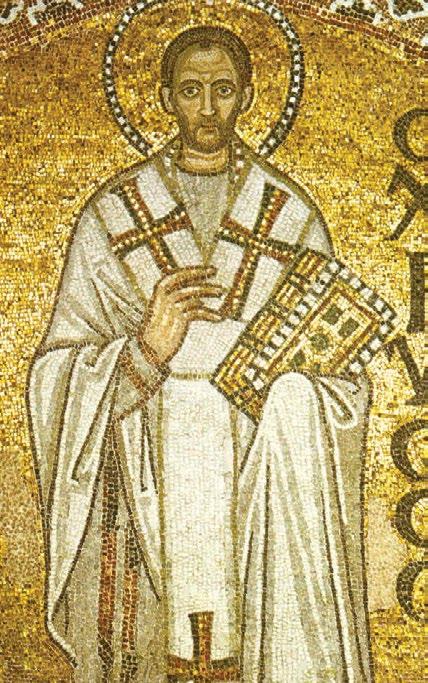
Prayer of Saint John Chrysostom before reading the Scripture
O Lord Jesus Christ, open the eyes of my heart, that I may hear your word and understand and do your will, for I am a sojourner upon the earth. Hide not your commandments from me, but open my eyes, that I may perceive the wonders of your law. Speak unto me the hidden and secret things of your wisdom.
On You I set my hope, O my God, that You will enlighten my mind and understanding with the light of your knowledge, not only to cherish those things which are written, but to do them; that in reading the lives and sayings of the saints I may not sin, but that such may serve for my restoration, enlightenment and sanctification, for the salvation of my soul, and the inheritance of life everlasting. For You are the enlightenment of those who lie in darkness, and from You comes every good deed and every gift. Amen.
In this Holy Year of Jubilee, Pope Francis has asked us to consider ourselves Pilgrims of Hope.
One of the most significant features of a Jubilee Year in the Catholic tradition is the Pilgrimage. We learn from Lumen Gentium, one of the documents that came from the Second Vatican Council, that even when not in a Jubilee Year, the Church asks us to consider ourselves “a pilgrim people”.
For centuries, the practice of pilgrimage has allowed Christians to respond to a stirring in their hearts, stepping forward and making a journey in hope of an encounter with the Lord. The Latin root of the word hints at crossing boundaries and walking across distances… but it is more than physical space that is crossed. On a pilgrimage, the interior part of the person is also changed through encounters: encounters with their travel companions, encounters with Jesus Christ.
If you choose to set out on this Lenten Program – either alone, or with a group – you are already responding to that stirring, to that call from the Lord. Allow yourself to hope that He will use this time that you set aside for Him to help you grow, and to help you draw nearer to Him in preparation for Easter.
Did you know that by your baptism, you “share in the priesthood of Christ, in his prophetic and royal mission”? (CCC 1268) 1 Our baptismal calling, which encompasses our participation in Christ’s priesthood, is sealed in the Sacrament of Confirmation. Our bodies, as temples of the Holy Spirit, become that house within which we exercise our priesthood, offering spiritual sacrifices, starting first with the gift of ourselves and our lives. (c.f. LG 10) 2
Our common baptismal priesthood is different to the ministerial priesthood. We cannot hear confessions or preside at Mass. On the flip side, we aren’t expected to pray the full Divine Office daily, or to minister to dying people in the middle of the night! There is an order to the way Christ has instituted both the ministerial priesthood and the common priesthood.
In practical terms, for those of us who are not called to Holy Orders, the baptismal priesthood calls us to:
a) intercede for others daily – we need to pray for each other, for our families, for our Church, for our world, and for God’s will in all things
b) offer sacrifices to God. These don’t need to be big things – this can be as simple (but not easy) as offering
whatever difficult circumstances we’re going through to God with a spirit of patience and trust. “Burnt offering from me you would refuse – my sacrifice a contrite spirit.” (Ps 51:16-17)
c) we are called as much as possible to participate in the work of the Church in a manner fitting to our state in life. The work of the Church involves prayer and service, but how we participate in that depends on the nature of our life.
Synod, from its Greek origins means to travel the way together. Synodality then denotes the particular style that qualifies the life and mission of the Church, expressing her nature as the People of God journeying together and gathering in assembly, summoned by the Lord Jesus in the power of the Holy Spirit to proclaim the Gospel. Synodality ought to be expressed in the Church’s ordinary way of living and working. Synodality, in this perspective, is much more than the celebration of ecclesial meetings and Bishops’ assemblies, or a matter of simple internal administration within the Church; it is the specific modus vivendi et operandi of the Church, the People of God, which reveals and gives substance to her being as communion when all her members journey together, gather in assembly and take an active part in her evangelising mission.
With this understanding, as a Church we are called to be synodal in all we do, including in our prayer and worship. We invite you to use this program to discern where the Holy Spirit is leading you on ‘the way’ to Easter, and how together we might journey toward the Paschal mystery.
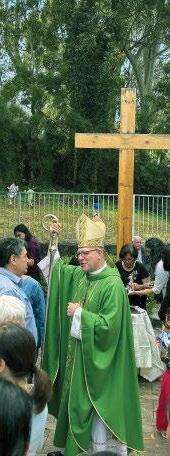
9 March 2025

Lord Jesus,
Thank You for bringing us together into the sacred light of Your presence. As You prepared for Your earthly Ministry in the desert, may You accompany us into the wilderness of our lives during this Lenten time of preparation. As People of Hope in Broken Bay, open our hearts more fully to the fruits of the Holy Spirit so that we can resolve by strength to overshadow the daily temptations within our own lives.
We ask this through Christ our Lord,
Amen.
Luke 4:113 (NRSVCE)
The Temptation of Jesus
Jesus, full of the Holy Spirit, returned from the Jordan and was led by the Spirit in the wilderness, where for forty days he was tempted by the devil. He ate nothing at all during those days, and when they were over, he was famished. The devil said to him, “If you are the Son of God, command this stone to become a loaf of bread.”
Jesus answered him, “It is written, ‘One does not live by bread alone.’”
Then the devil led him up and showed him in an instant all the kingdoms of the world. And the devil said to him, “To you I will give their glory and all this authority; for it has been given over to me, and I give it to anyone I please. If you, then, will worship me, it will all be yours.” Jesus answered him, “It is written, ‘Worship the Lord your God, and serve only him.’”
Then the devil took him to Jerusalem, and placed him on the pinnacle of the temple, saying to him, “If you are the Son of God, throw yourself down from here, for it is written, ‘He will command his angels concerning you, to protect you,’ and ‘On their hands they will bear you up, so that you will not dash your foot against a stone.’”
Jesus answered him, “It is said, ‘Do not put the Lord your God to the test.’” When the devil had finished every test, he departed from him until an opportune time.
“In the secret of my heart, teach me wisdom” (Psalm 51:6)
You are invited to take 3-5 minutes to silently re-read the passage you have just heard. We encourage you to underline one or two things from the passage that stood out to you. Feel free to write down – for yourself and no one else – anything new or insightful that the Lord might have placed on your heart to ponder. No matter how plain or simple or deep or profound these thoughts may be, take one more moment to thank Jesus for His word to you before returning to the group.
As the Lenten season begins, we are invited to journey with Jesus into the wilderness, where He boldly confronts and triumphs over the devil’s temptations — a powerful story that we hear every year on the First Sunday of Lent. This passage is rich with meaning, offering us profound insights into preparation, strength, and trust in God as we face our own struggles with sin and temptation. As we travel through the Jubilee Year, it challenges us to take up our role as Pilgrims of Hope, moving toward a deeper relationship with Christ and a renewed trust in His promises.

Gospel Reflection continued
The wilderness, stark and barren, is not just a physical location but also a deep metaphor for our spiritual lives. Jesus, “full of the Holy Spirit,” is led into the wilderness to fast and pray for 40 days. These moments of testing prepare Him for His mission and strengthen His reliance on the Father.
Temptations today are like pop-up ads on the internet—relentless, annoying, and always showing up when you least expect them. Back in the day, you had to wander into a garden to find a forbidden fruit. Now, it’s as easy as picking up your phone: one swipe, and boom, you’re tempted! They’re on your desk, your doorstep, your right, your left—front, back, and even sneaking into your fridge (yes, that second slice of cake is watching you). So, today, we’re practically living in a temptation theme park. We don’t really need to go into the wilderness to be tempted. Stay at home, and temptation will kindly deliver itself to your doorstep faster than your Amazon order. It creeps in like a bad Wi-Fi signal, telling you there’s no hope, no purpose, no eternal life.
Pope Francis reminds us, “Hope opens new horizons, making us capable of dreaming what is not even imaginable.” Lent invites us to dream of the transformation God desires in our lives and to trust that He will provide the strength we need for the journey. As Saint Augustine said, “Do not despair; one of the thieves was saved. Do not presume; one of the thieves was damned.” Our response to God’s grace determines our path.
Facing temptation with the power of God’s Word involves relying on Scripture to strengthen our resolve and align our hearts with God’s will. Jesus Himself used Scripture to overcome temptation in the wilderness, declaring, “It is written, ‘One does not live by bread alone, but by every word that comes from the mouth of God” (Mat 4:4). Similarly, Saint Paul reminds us to “put on the whole armour of God to withstand the schemes of evil.” (Eph 6:11).
As Pilgrims of Hope, we are called to resist the false promises of the world and place our trust in God’s Eternal Word.
The Church teaches that Scripture and prayer are essential tools in resisting temptation, as they unite us with God’s grace. Saint Augustine wisely noted, “By the help of God, we can overcome sin and live righteously.” Through Scripture, the Sacraments, and the guidance of the Church, we find strength to resist temptation and live in holiness, embodying the hope that God’s Word offers to all who seek Him.
Dei Verbum 21 notes, “For in the sacred books, the Father who is in heaven meets His children with great love and speaks with them; and the force and power in the Word of God is so great that it stands as the support and energy of the Church, the strength of faith for her sons, the food of the soul, the pure and everlasting source of spiritual life.”
Let us walk as Pilgrims of Hope, trusting that every trial is an opportunity to grow closer to Christ. Together, let us embrace the wilderness, confident to experience his pardon and the writing off of all our interior debts. Read the Word of God
to overcome temptation — this is the ultimate and definitive way to resist it. Remember: ignorance of Scripture is ignorance of Christ.
Pilgrims of Hope in Action 3
Receive the Jubilee indulgence by visiting:
• The Shrine of Hope with the relic of Saint John Paul II at St Patrick’s Church, East Gosford.
• The Shrine of Hope for Young People with the relic of Blessed Carlo Acutis at Our Lady of Dolours Church, Chatswood.
• The Shrine of Hope for Priests and Vocations with the relic of Saint John Vianney at St Mary’s, Manly Freshwater.
(cf. Decree on the Granting of Indulgence)

Fiona Brown
Learning Partner: Catechesis 7-12
Evangelisation & Catechesis
Catholic Schools Broken Bay
Reflecting on my first overseas trip, I am reminded of this Gospel Reading where Jesus is led by the Spirit into the wilderness and tempted by the devil. This resonates deeply with my own experience as a young teacher, full of the Holy Spirit and joy, embarking on an adventure to explore the world.
1. You are invited to dream of the transformation that God desires in our own life.
2. Take a few minutes to reflect upon how God might be calling you in the wilderness to transform your life this Lent?
3. With strength and resolve, what could be one practical or spiritual element that you could include into this week to shine light on your Lenten preparations?
4. What are the temptations of your daily life that distract you from living fully present lives?
My journey took an unexpected turn when I fell ill shortly after arriving in a foreign country. The excitement of my first experience abroad quickly turned into fear and uncertainty. I found myself in a hospital, unable to understand the language, and overwhelmed by the need to hand over my passport and visa. The fear of the unknown gripped me as I sat alone in my hospital room, clutching the rosary beads I had brought with me.
Jesus responds to the devil’s temptation by saying, “Man shall not live on bread alone.” (Luke 4:4), at my lowest point, I was unable to eat and fearful of my fate. The food and treatments were unfamiliar, and I had to place my trust in the medical system. More importantly, I turned to my faith and trusted in God to help me through what felt like a desolate and lonely desert. The hospital felt like a wilderness to me and each day brought new uncertainties. My two-week hospital stay felt like forty days, mirroring Jesus’ time in the
3. The indulgences outlined here, as well as those in the section ‘Pilgrims of Hope in Action’ in each homily, are adapted from the Decree on the Granting of Indulgence during the Ordinary Jubilee Year 2025, as issued by His Holiness Pope Francis on 13.05.2024. For more details about the indulgences, please do read the decree itself: https://press.vatican.va/content/salastampa/en/bollettino/pubblico/2024/05/13/240513f.html
wilderness. I was constantly worried about what would come next as the doctors searched for answers to my condition. It felt like a lifetime of waiting and uncertainty.
During this time, I found solace in prayer. As written in Luke 4:8, “Worship the Lord your God and serve him only.” My faith was challenged, but it was also strengthened. I prayed for answers and for the strength to endure this trial. The desert is like a metaphor for my own feelings of loneliness and isolation.
In the end, my faith carried me through. I realised that, like Jesus, I was not alone in my wilderness. God was with me, guiding me and giving me the strength to overcome my fears. This experience taught me the importance of trusting in God, even in the most challenging and uncertain times. It reminded me that, no matter how desolate the desert may seem, we are never truly alone.

1. We have listened today to Luke’s account of Jesus’ journey into the wilderness and the ultimate trust He placed in His Father to overcome the wicked temptations of the devil. Can you take this time to recall experiences in your own lives, where you have been put to the test but your faith and belief in Jesus Christ was your ultimate lifeline?
2. How have these experiences shaped your life so as to grow in the light of the Lord.

Heavenly Father,
Thank you for accompanying us gently into the wilderness and standing ever so present amongst us throughout the daily temptations of our own lives. With your grace, may we seek to deepen our relationship with Your Son, through listening to His Word, through works of charity, fasting and prayer, always mindful of the profound love that Jesus holds unequivocally for us.
Through Christ our Lord, Amen.
16 March 2025

Lord Jesus,
It is good for us to be here! Let this gathering, like the mountain where You stood with Moses and Elijah in radiant glory, be a place of true encounter. Heal us of complacency, that we see You in a new and awesome way.
As People of Hope in Broken Bay, teach us to listen to You and to each other. We resolve to carefully and intentionally give You the gift of our wakefulness, our attention.
Come, Holy Spirit, and guide us as we listen to the Word, so that when this time of prayer is over, and we go down from the mountain and leave this place, we will have such abundant fruit of prayer that it not only sustains us, but overflows that we may share with others.
Amen.
Luke 9:2836 (NRSVCE)
The Transfiguration
Now about eight days after these sayings Jesus[a] took with him Peter and John and James, and went up on the mountain to pray. And while he was praying, the appearance of his face changed, and his clothes became dazzling white. Suddenly they saw two men, Moses and Elijah, talking to him. They appeared in glory and were speaking of his departure, which he was about to accomplish at Jerusalem. Now Peter and his companions were weighed down with sleep; but since they had stayed awake, they saw his glory and the two men who stood with him. Just as they were leaving him, Peter said to Jesus, “Master, it is good for us to be here; let us make three dwellings, one for you, one for Moses, and one for Elijah” — not knowing what he said. While he was saying this, a cloud came and overshadowed them; and they were terrified as they entered the cloud. Then from the cloud came a voice that said, “This is my Son, my Chosen; listen to him!” When the voice had spoken, Jesus was found alone. And they kept silent and in those days told no one any of the things they had seen.
“In the secret of my heart, teach me wisdom” (Psalm 51:6)
You are invited to take 3-5 minutes to silently re-read the passage you have just heard. We encourage you to underline one or two things from the passage that stood out to you. Feel free to write down – for yourself and no one else – anything new or insightful that the Lord might have placed on your heart to ponder. No matter how plain or simple or deep or profound these thoughts may be, take one more moment to thank Jesus for His word to you before returning to the group.
Administrator Parish of Wyoming
“This is my Son, my Chosen; listen to him”
In the Gospel of Luke 9:28-36, we encounter the magnificent scene of the Transfiguration, where Jesus’ divine glory is revealed to Peter, James, and John. As the disciples witness this extraordinary event, a voice from the cloud declares, “This is my Son, my Chosen; listen to Him.” (Lk 9:35). This divine command is both an invitation and a mandate, calling us to attune our hearts to Jesus. The Father’s directive to ‘listen to him’ resonates as a guiding light on our journey toward eternal glory.

Gospel Reflection continued
Throughout Scripture, listening to God’s Word is portrayed as the foundation of a faithful life. In Deuteronomy 6:4, we read, “Hear, O Israel: The Lord is our God, the Lord alone.” This call to listen accentuates the importance of living in covenantal relationship with God. Similarly, in John 10:27, Jesus says, “My sheep hear my voice. I know them, and they follow me.” Listening to Jesus is not passive; it is an act of faith that leads to discipleship and trust in His promises. Saint Paul reminds us in Romans 10:17 that “faith comes from what is heard, and what is heard comes through the word of Christ.” By listening to Jesus, we strengthen our faith and allow His Word to transform our lives.
The Father’s command to listen to Jesus highlights the centrality of Christ in our lives. Listening is more than hearing; it involves an intentional opening of our hearts and minds to His teachings, His example, and His Spirit. In the Transfiguration, the disciples are given a foretaste of the resurrection glory that awaits those who follow Christ faithfully. This moment reveals the goal of our pilgrimage towards God. Listening is an experience with three fundamental attitudes. First, thanksgiving, with hearts open to praise God for his many gifts, especially the gift of life. Then, a spirit of seeking as an expression of our heart’s unquenchable thirst to encounter the Lord. And finally, penance which helps us to look within, to acknowledge the wrong paths and decisions we have sometimes taken.
Listening to Jesus, therefore, is not an optional practice but a vital aspect of Christian living. Through Scripture, the Sacraments, and prayer, we encounter Christ, allowing His voice to guide us in truth and hope. We must remember that Sacraments and Scripture are the living wellsprings from which the Church draws her life and strength. The Liturgy of the Hours, to which we are all earnestly called, is the very breath of the Church — the rhythm through which she moves, inhales the fresh air of grace, and exhales her praise and intercession to God
Is it difficult to listen to others? Someone once shared with me, “The most difficult thing I face in life is listening to others. I try, but I often end up in arguments.” This struggle resonates with many of us. Listening is a profound act of love and humility, yet it is one of the most challenging tasks in today’s world. As Pope Francis reminds us, “Listening is more than hearing; it is an openness of heart.” We often prefer to speak, but genuine listening requires patience, selflessness, and a willingness to embrace others as they are. Saint Benedict taught in his Rule, “Listen with the ear of your heart,” emphasising that listening fosters deeper relationships and understanding. We must listen more and speak less — God gave us one mouth and two ears, not because He ran out of material, but to make it clear: tuning in is twice as important as broadcasting!
Listening is respecting and bringing hope to those facing difficulties and disappointment. Despite its importance, we often neglect this noble task. Failing to listen to our family members creates misunderstandings and conflicts. Ignoring the voices of our faith community fosters disunity, which goes against the spirit of Jesus. If we cannot listen to our brothers and sisters, especially those with whom we live and work, how can we truly listen to the voice of God ‘listen to him’?
Receive the Jubilee indulgence by participating in Eucharistic adoration and meditation, concluding with the Our Father, a profession of faith in any legitimate form, and invocations to Mary, Mother of God.
(cf. Spes non confundit, 24; Decree on the Granting of Indulgence)

Deacon Kevin McGregor Deacon, Cathedral Parish of Hornsby
This week’s Reading is a well-known story from Luke’s Gospel. The mountain top experience where Jesus’ true nature is revealed to a lucky few. Of course they don’t understand fully what is happening, nor what to do with the experience. I think anyone, from any era, would be in awe of what had happened in front of these disciples. Their responses would likely be the same.
It would be a long, silent walk back down the mountain trying to process the experience. “What am I going to tell the others? They won’t believe this; they’ll think I’m crazy. I’m not sure I believe it.”
1. What is one concrete thing that you can do to listen to Jesus this week, to give Him the gift of your loving attention?
2. In any of your family relationships, are you aware of any time that you may have left someone you love feeling unheard or unseen? Is there one concrete thing you can do in the coming week in that specific relationship to help that person feel heard?
Whilst on pilgrimage in the Holy Land, I had the privilege of visiting Mount Tabor, where according to Christian tradition, this event took place. The feeling I had being there was profound. To be in this location and know that we stood on such Holy ground. Yet I can guarantee it was nothing like the disciples had with Jesus that night.
My mind then goes to the other disciples who missed out on that experience. They had to go out on mission without the advantage that Peter, James and John received. Jesus chose these three with purpose, this experience was necessary in some way to shape them personally for Mission.
Personal Story continued
Some of us in life may have easily identifiable mountain top experiences that inspire us in our Christian mission, others may have to look a bit harder for inspiration. For me it took a formation process to Permanent Diaconate to be able to go back, reflect and see the many times in life that Christ had tried to lift me to a higher spiritual place, and it wasn’t on pilgrimage.
It was in the daily interactions with “ordinary people” or loved ones, like my uncle, who was a Catholic priest. In hindsight it was Christ’s love shining through him for me. I can remember the delight in my father’s eyes as we basked in the glow of “The Uncle’s” presence. He revealed Christ’s glory to me in his actions and stories. The way he would celebrate Mass in our home and preach of Christ’s love for us. There was a power in his belief of this reality that was so apparent, especially obvious to me, in the way others responded to him as well. For me this is Christ truly revealed.
This is it; we don’t have to ascend the mountain to experience the transfigured Christ. That was for Peter, James and John. Christ comes to us where we are and reveals himself, lifting us. It’s often very personal, just meant for us. Like the experience the disciples had that night, we may not fully understand it at first. It may take time, deep reflection and prayer, but it can transform us. It will allow Christ’s glory to shine through us. That’s the beauty of Lent. The Church gives us this time to focus and reflect, to search for Christ revealed in our lives.

1. We have just heard the observation that Jesus chose Peter, James and John for the mountain experience because it was what they specifically needed to be ready for Mission. What experiences in your life recently might the Lord be using to shape you for Mission?

Heavenly Father,
We have spent this time together in prayer to listen to Your Son. We long for deeper relationship with You, and for peaceful relationships with both family and parish community. Help us to grow in the art of listening with open hearts. Help us to give the gift of respect and presence to the people in our lives by the way we listen. Now that the “mountaintop” experience of our gathering here has come to an end, help us to go out and to share the gifts You have given us with the people in our daily lives.
We ask this in Jesus’ name, Amen.
23 March 2025

Lord Jesus,
You lovingly call us into Your vineyard, giving us sacred opportunities and bestowing upon us the grace to sow lives of richness, and faithfulness, of good deeds and kind thoughts.
As People of Hope in Broken Bay, we entrust that You open our ears and our eyes to the fullness of Your Word today. May our hearts be transformed and the fruits of our labours be plentiful and abundant so that we can share Your goodness openly with others.
We ask this through Christ our Lord, Amen.
Luke 13:19 (NRSVCE)
Repent or Perish
At that very time there were some present who told him about the Galileans whose blood Pilate had mingled with their sacrifices. He asked them, “Do you think that because these Galileans suffered in this way they were worse sinners than all other Galileans? No, I tell you; but unless you repent, you will all perish as they did. Or those eighteen who were killed when the tower of Siloam fell on them — do you think that they were worse offenders than all the others living in Jerusalem? No, I tell you; but unless you repent, you will all perish just as they did.”
The Parable of the Barren Fig Tree
Then he told this parable: “A man had a fig tree planted in his vineyard; and he came looking for fruit on it and found none. So he said to the gardener, ‘See here! For three years I have come looking for fruit on this fig tree, and still I find none. Cut it down! Why should it be wasting the soil?’ He replied, ‘Sir, let it alone for one more year, until I dig around it and put manure on it. If it bears fruit next year, well and good; but if not, you can cut it down.’”
“In the secret of my heart, teach me wisdom” (Psalm 51:6)
You are invited to take 3-5 minutes to silently re-read the passage you have just heard. We encourage you to underline one or two things from the passage that stood out to you. Feel free to write down – for yourself and no one else – anything new or insightful that the Lord might have placed on your heart to ponder. No matter how plain or simple or deep or profound these thoughts may be, take one more moment to thank Jesus for His word to you before returning to the group.
Fr Alex Peter Selvaraj MSFS Administrator Parish of Wyoming
“He replied, ‘Sir, let it alone for one more year”
The parable of the barren fig tree in Luke invites us to contemplate God’s immense patience and mercy. The vinedresser’s plea to give the tree another year reflects the hopeful persistence of divine grace. If it were up to us, we’d have probably chopped that fig tree down to make room for a deck chair or turned that tree into firewood by now. As Pilgrims of Hope, we are reminded that God gives us opportunities to repent, grow, and bear fruit. His patience is not a license for complacency but a call to conversion and renewal.

Gospel Reflection continued
In the context of the Jubilee Year of Hope, this passage, “let it alone for one more year” reminds us that every moment of our lives is a gift of God’s mercy. Yes, it is. But let us listen to Saint Peter (2 Peter 3:9) “The Lord is not slow about his promise, as some think of slowness, but is patient with you, not wanting any one to perish, but all to come to repentance.” Just as the fig tree is given more time to bear fruit, we too are granted the grace of time to align our lives with His will. However, this extension is not endless. Saint Augustine exhorts us: “God has promised forgiveness to your repentance, but He has not promised tomorrow to your procrastination.”
While God’s patience is a profound gift, it must not lead us to spiritual lethargy. The parable reminds us of our responsibility to respond. As Pilgrims of Hope, let us embrace this Jubilee Year as an opportunity to reflect on our spiritual lives and strive for repentance. Like the fig tree, benefit from the grace and care of the Divine Vinedresser and commit us to bearing fruit that glorifies Him.
As pilgrims journeying toward eternal life, we are called to use the time and graces given to us wisely. Saint John Paul II, in his encyclical Dives in Misericordia, emphasised that God’s mercy is the foundation of hope. Repentance is not merely about avoiding punishment but about being reconciled to God, who is the source of our joy and fulfilment.
In Luke 13:8, the vinedresser’s willingness to labour for the tree symbolises Christ’s intercession and the Church’s role in nurturing souls. Through the Sacraments, especially Reconciliation and the Eucharist, the Church provides the spiritual nourishment we need to grow in holiness. The Sacrament of Reconciliation is central to Lent, offering us a chance to experience God’s boundless mercy. Reconciliation is not a humiliation but a liberation. Reconciliation is the only and the definite way to restore our dignity as children of God. Repentance is not about blaming others or seeking external causes for my struggles but about turning inward, seeking transformation and to evaluate my life. Repentance is not merely a one-time act but an ongoing journey of conversion.
We must often remind ourselves that, I, too, was that fig tree — given a second chance, spared the axe, and fertilised with God’s grace. While I soak in all these second chances, am I offering them to others? Or am I holding grudges tighter than a squirrel hoarding nuts?
In America, there’s a concept of a “Second Chance Month” observed in April. What if, this Lent, we declared our own Second Chance Day? A day to forgive, encourage, and lift up those we’ve discouraged or, downright flattened with our words or actions. It’s a chance to trade grudges for grace and sarcasm for support. If God can wait for me to grow some fruit, surely, I can offer a little fertiliser of kindness to others. Let’s give it a go — before we end up as firewood in someone else’s parable.
Pilgrims of Hope in Action.
Receive the Jubilee indulgence by performing an act of charity for the souls in purgatory, helping them obtain full mercy.
(cf. Decree on the Granting of Indulgence, IV ed., norm 18.1)

We are gently encouraged today to repent through the Sacrament of Reconciliation, so as to restore our dignity as children of God and shine our light in the vineyard of the Lord.
1. How might we prepare our hearts this Lent to seek the fullness of God’s mercy and His promise of forgiveness?
2. Might there be anyone in our own lives whom we have experienced hurt or distress that we could ask God’s grace to forgive them?
3. How might we sprinkle kindness and goodness this week so that all whom we encounter, are left with a sense of joy and peace in their own hearts?
Chris Lee Head of Clergy & Parishes Broken Bay Diocese of Broken Bay
In this Sunday’s Gospel reading, we hear Jesus speaking with His disciples about the importance of repentance, and the fragility of life. Jesus grabs the attention of His disciples by highlighting the state-sanctioned killings of Pilate, and the deaths caused by the unexpected collapse of the tower of Siloam.
Jesus then turns their attention away from external disasters and outcomes and directs them to turn inwards and examine their soul. He makes the point that, while they have so far survived the hazards of human society, they should not mistake their good fortune as evidence of God’s special blessing.
In this passage, we see that Jesus is urging his disciples to look inwards, to examine their hearts, and to repent. He makes sure that they understand that the call for repentance is universal—for everyone. No matter what our status is in society, or our circumstances in life, He is urging all of His followers to not rest on our laurels and become complacent in our sin and shortcomings.
I remember when I was growing up, finding myself in a number of compromising situations. Often, I would ask; “How did I get myself into this?” While this was posed as a question, it was more of a statement, as there was very little internal reflection involved.
Personal Story continued
This pattern changed on the Easter Long Weekend of 2012. I had decided to attend a mate’s BBQ on Holy Saturday. The evening was like most, consisting of enjoying food and drinks with friends. However, it soon turned into a bigger night than I had anticipated.
A group of us decided late in the evening that we would head into the city for a night out. The small gathering became a larger one, and before long we were in the city and then not long after we were ejected from our first venue.
On the way to the next location, we found ourselves in a physical altercation with another group. This altercation led to me being cut across the left eye, which led to me permanently losing my vision on that side, and having two metal plates placed in my face.
Losing my left eye at 18 was the most confronting realisation that as a young man my actions had serious and permanent consequences. Many of the plans that I had for my life were in rack and ruin. I was left adrift and wondered, “where to from here?”
During my recovery, I was housebound for six months. This experience, while extremely isolating, also gave me time to reflect on my decisions, and to search my heart for what motivated them.
What I found was that the journey to the heart was a long and painful road. However, along this road I discovered that I was not walking alone. Jesus was with me. By acknowledging my fragility, my wounds and need for repentance, I allowed Him to heal me.
This passage reminds me not only of the urgency of repentance but, more importantly, the need to turn towards Jesus. Don’t be content with the material world — turn inward to the spiritual, to Jesus. Allow Him to walk with you, receive His mercy, and become a new creation in Him.
A pilgrimage to our heart can allow us to become Pilgrims of Hope this year of Jubilee.

Take a few moments to reflect upon what it might mean to you to make a pilgrimage to your heart. Has there been a moment/s in your life where you may have despaired and questioned “whereto from here”. How has the Lord accompanied you through such moments. Can we be Pilgrims of Hope together as we listen to the ways that God works through each other.
Heavenly Father,
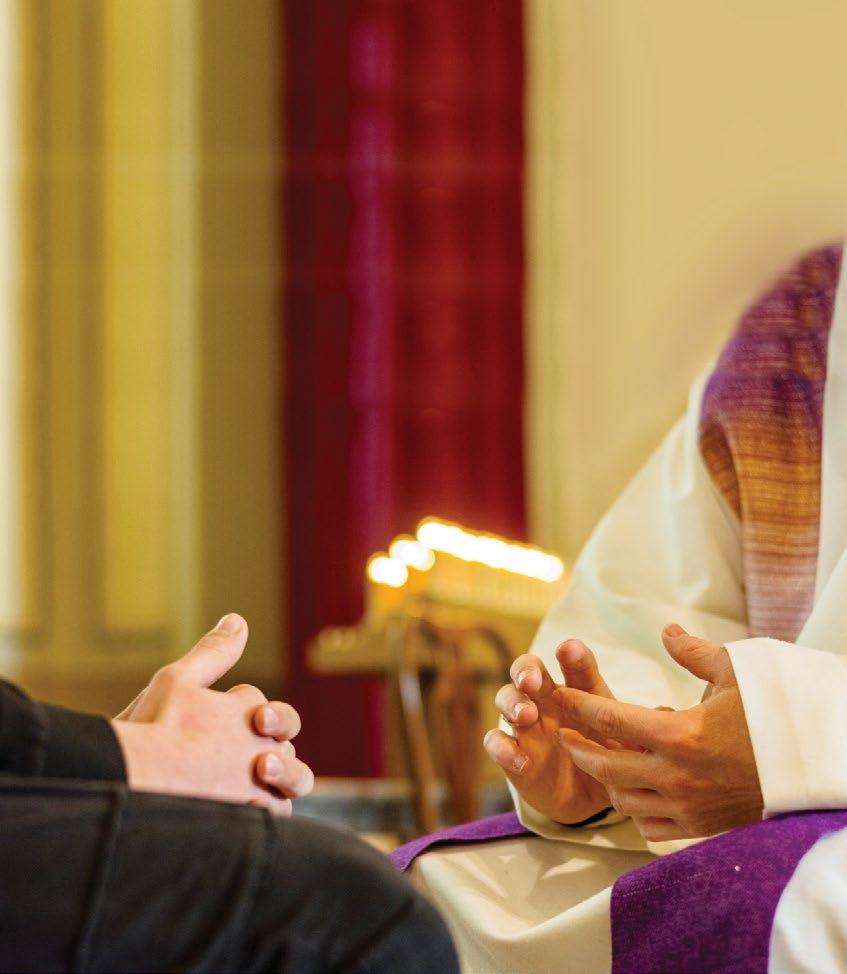
Thank You for the gift of Reconciliation so that we may repent with contrite hearts to receive the fullness of Your mercy and forgiveness. Never let us stray into the barren and desolate vineyard which sometimes may surround us. Let us always walk with confidence and hope in the promise of Jesus Christ so that we may be bearers of goodness and charity to all whom we encounter.
Through Christ our Lord,
Amen.
30 March 2025

Merciful Father,
Thank you – thank you! - for showing us that part of Your Heart that longs for us to turn to You. Thank you for the arms of Your Son, open wide on the Cross, that remind us that Your arms are always open. I never want to feel afraid to return to You when I’ve wandered off safe paths. I never want to hurt You by taking Your gifts to me for granted… but if I do make mistakes or find myself off track, please always send forth Your Spirit to inspire me to turn back to You; renew my heart as You renew the face of the earth. You are our hope, O Lord! Your love is steadfast, and Your mercy is extravagant.
We praise You and we thank You!
Amen.
Now all the tax collectors and sinners were coming near to listen to him. And the Pharisees and the scribes were grumbling and saying, “This fellow welcomes sinners and eats with them.”
So he told them this parable:
Then Jesus said, “There was a man who had two sons. The younger of them said to his father, ‘Father, give me the share of the property that will belong to me.’ So he divided his property between them. A few days later the younger son gathered all he had and travelled to a distant country, and there he squandered his property in dissolute living. When he had spent everything, a severe famine took place throughout that country, and he began to be in need. So he went and hired himself out to one of the citizens of that country, who sent him to his fields to feed the pigs. He would gladly have filled himself with the pods that the pigs were eating; and no one gave him anything. But when he came to himself he said, ‘How many of my father’s hired hands have bread enough and to spare, but here I am dying of hunger! I will get up and go to my father, and I will say to him, “Father, I have sinned against heaven and before you; I am no longer worthy to be called your son; treat me like one of your hired hands.”’ So he set off and went to his father. But while
he was still far off, his father saw him and was filled with compassion; he ran and put his arms around him and kissed him. Then the son said to him, ‘Father, I have sinned against heaven and before you; I am no longer worthy to be called your son.’ But the father said to his slaves, ‘Quickly, bring out a robe — the best one — and put it on him; put a ring on his finger and sandals on his feet. And get the fatted calf and kill it, and let us eat and celebrate; for this son of mine was dead and is alive again; he was lost and is found!’ And they began to celebrate.
“Now his elder son was in the field; and when he came and approached the house, he heard music and dancing. He called one of the slaves and asked what was going on. He replied, ‘Your brother has come, and your father has killed the fatted calf, because he has got him back safe and sound.’ Then he became angry and refused to go in. His father came out and began to plead with him. But he answered his father, ‘Listen! For all these years I have been working like a slave for you, and I have never disobeyed your command; yet you have never given me even a young goat so that I might celebrate with my friends. But when this son of yours came back, who has devoured your property with prostitutes, you killed the fatted calf for him!’ Then the father said to him, ‘Son, you are always with me, and all that is mine is yours. But we had to celebrate and rejoice, because this brother of yours was dead and has come to life; he was lost and has been found.’”

the Silence of My Heart
“In the secret of my heart, teach me wisdom” (Psalm 51:6)
You are invited to take 3-5 minutes to silently re-read the passage you have just heard. We encourage you to underline one or two things from the passage that stood out to you. Feel free to write down – for yourself and no one else – anything new or insightful that the Lord might have placed on your heart to ponder. No matter how plain or simple or deep or profound these thoughts may be, take one more moment to thank Jesus for His word to you before returning to the group.
Fr Alex Peter Selvaraj MSFS Administrator Parish of Wyoming
“I will get up and go to my Father, and I will say to him, ‘Father, I have sinned against heaven and before you”. Have we ever spoken the words of Lk 15:18 in our lives? If not, let us begin to say them as often as possible, allowing them to shape our hearts and actions. Most of us have at least a few things worth bringing up! And if you’re worried about repetition, don’t be, God doesn’t get tired of hearing, “Sorry, I messed up,” even if your earthly dad might raise an eyebrow after the tenth apology about the car.
Lent is a sacred season of return, a journey of hope as pilgrims seeking renewal and forgiveness in the loving arms of God. The words of Lk 15:18, spoken by the prodigal son, resonate as an invitation to rise from our imperfections and embrace the abundant mercy of our Heavenly Father. In this Jubilee Year of Hope, we are called to make the most of this opportunity to experience God’s transformative forgiveness.
The parable of the prodigal son embodies the central theme of God’s mercy and forgiveness. The son’s decision to return to his father after squandering his inheritance mirrors our own spiritual journey. Often, we find ourselves distant from God, burdened by sin and guilt. We often misuse the time and resources that have been generously provided to us. Yet, like the father in the parable, God eagerly awaits our return, ready to forgive and restore us. God is at the window, not watching us but waiting for our return.
In his Apostolic Letter Misericordia et Misera, Pope Francis reminds us: “The mercy of God is not an abstract idea but a concrete reality through which he reveals his love as that of a father or a mother, moved to the very depths out of love for their child.” This Lent, we are invited to approach the Sacrament of Reconciliation, which the Catechism of the Catholic Church (CCC 1468) describes as “a spiritual resurrection” and “a restoration of the dignity and blessings of the life of the children of God.”
As Pilgrims of Hope, we journey with trust, knowing that God’s mercy opens the door to a brighter future. Lent is a privileged time to rise from the wet cement of our spiritual lethargy. This wet cement, selfpossessed selfishness, pride, resentment, anger, lust, fear, and attachment to material things. They eventually harden if we stand on it. It weighs us down, paralyses us, and prevents us from moving forward. Lent is a time not to remain stagnant but to awaken a desire to take action. Saint John Vianney, said, “The good God will pardon a repentant sinner faster than a mother would snatch her child out of the fire.” Reconciliation is not opposed to justice but rather expresses God’s way of reaching out to the sinner, offering him a new chance to look at himself, convert and believe.
Luke 15:18 challenges us to act “I will get up and go.” This decision requires humility, courage, and trust. In Lent, we are invited to reflect on the barriers preventing our return to God and to take concrete steps to overcome them. Begin by acknowledging, just like the prodigal son and the tax collector who said, ‘Have mercy on me, a sinner’. Let us not delay, for as Saint Paul urges: “Now is the acceptable time; now is the day of salvation.” (2 Cor 6:2)
May this Lent be a season of profound renewal, where we rise as Pilgrims of Hope, embracing God’s forgiveness and sharing it with others. Like the Prodigal Son, let us experience the joy of being welcomed home, clothed in grace, and empowered to walk in newness of life. Together, let us journey toward the hope of Easter, confident in God’s unending mercy and love.
Grant, O, Lord, that this Holy year be the year of the great return and great forgiveness.
Pilgrims of Hope in Action.
Receive the Jubilee indulgence by performing one of the corporal works of mercy… or, if you’re feeling particularly saintly, why not tick off two, three, or even all of them? You could feed the hungry, give drink to the thirsty, clothe the naked, welcome the stranger, heal the sick, visit the imprisoned, or bury the dead. (And if you manage all seven, you might just need a medal!)
(cf Spes non Confundit, 10).

Have a look again at the list of barriers that can sometimes hold us back like wet cement in the Gospel Reflection above – are you aware of any of these in particular that might be a struggle for you?
1. Now have a look at the list of corporal works of mercy in the “Pilgrims of Hope in Action” – are there any of these works of mercy that you find more of a challenge than the others?
2. Is there one concrete resolution you can make to fit one of these into your coming week?
Brenda Timp Principal Mercy Catholic College, Chatswood
The Prodigal Son story is about forgiveness and redemption. It awakens for me three vignettes of hope from the three secondary schools in which I have taught over the last 23 years. In a landscape of rapidly evolving culture that is often difficult to interpret, the young people I encounter continue to fill me with immense hope!
As I entered my very first lesson with the Year 12 Studies of Religion (SOR) class, a particularly disgruntled student placed his feet on the desk, thrust his elbows confidently outwards, clasped his hands behind his reclining head and fired me a look of challenge. I redoubled my efforts to challenge him - and the class - back. He achieved the top result in SOR in our school that year, and then off he went, shedding the shackles of school with an air of arrogance, anger and relief.
A year later, on the day of the 2002 Bali bombings, he delivered a gift for me, writing in the card how grateful he was for what he’d learnt in our class, and how the events of that day had found him reflecting on the wisdom of religious education.
I realise the thanks were due to him. I’d been out of teaching for many years and was unqualified to teach SOR. The experience reset a focus that has been my mainstay.
A proverbial square peg in a round hole, the boy arrived at my second school on an inter-school transfer, his family hoping - in what was very wishful thinking - that he might benefit from a fresh start. It was not worth arguing with him when he relentlessly wore a hoodie (not school uniform) pulled well over his head and sat against a corner wall in our SOR class interjecting regularly that he was an atheist, challenging every tenet we explored, and demonstrating his contempt by refusing to complete work.
Some years later he sent me this email:
Hello Mrs Timp, I just wanted to say that I know now I was wrong about Jesus Christ.
When I contacted him recently to ask whether I might share a little of his story, he wrote back:
I am touched that you remember that from so long ago... I am unashamed to profess my faith in our Lord Jesus Christ!
Though I’d been the ‘eldest son’ in the Gospel story, I found myself humbled by this ’prodigal son’.
We were learning about forms of Christian personal and communal prayer. So, on a cold, rainy day, I put on the heater in the Chapel of my third school, dimmed the lights, lit the candles and
took the class in to pray the Rosary. At the end, the students were reluctant to return the rosaries. They took comfort from the feel of them in their hands, the connection they gave them to something deep within. Including those not Catholic. We spoke about ancient uses of beads - Greek worry beads and Hindu prayer beads - and also about the contemporary ‘fidget’ gadgets that those with anxiety are encouraged to have handy for moments of stress. Then we ‘wasted’ a lesson making rosary bracelets – a rosary with one decade –to carry in their pockets.
Often when passing these students in the school passage, I ask, “What have you got in your pocket to remind you that you are not alone?”
“My rosary,” they still reply.
Weeks after that rosary-threading, a student hung back after class. Her parents had visited Turkey, and she’d asked them to bring back a rosary for me from St Anne Church in Trabzon city, Turkey.
It is in my car, and I pray it every day.

1. Which of these three vignettes spoke to you most? Why?
2. Do you have a similar vignette of your own that you’d like to share with the group?
Heavenly Father,
Thank you for this time we have spent together in Your presence. How wondrous that You wish to show us this part of Your Heart… that You wish to draw us deeper into Your love and forgiveness. The arms of Your Son, open wide on the Cross, are a visible reminder of Your open arms, waiting to welcome us back any time we stumble. Help us to truly know Your steadfast love for us. Help us to always trust that no matter how far we stray, we can always turn back to You, who are bigger than any barrier we might find in the way. As we lean into Your mercy this Lent, Father, help us to share that mercy with the people in our lives, too.
Amen.

6 April 2025

Lord Jesus,
With grateful and united hearts, we gather together in Your Name. As a People of Hope in Broken Bay, we long to receive Your grace and peace into our hearts. In the quietness of this time before us, may we immerse ourselves into Your Word, mindful and open to where the Holy Spirit might be speaking to or guiding us today.
We ask this through Christ our Lord, Amen.
John 8:111 (NRSVCE)
Then each of them went home, while Jesus went to the Mount of Olives. Early in the morning he came again to the temple. All the people came to him and he sat down and began to teach them. The scribes and the Pharisees brought a woman who had been caught in adultery; and making her stand before all of them, they said to him, “Teacher, this woman was caught in the very act of committing adultery. Now in the law Moses commanded us to stone such women. Now what do you say?” They said this to test him, so that they might have some charge to bring against him. Jesus bent down and wrote with his finger on the ground. When they kept on questioning him, he straightened up and said to them, “Let anyone among you who is without sin be the first to throw a stone at her.”
And once again he bent down and wrote on the ground. When they heard it, they went away, one by one, beginning with the elders; and Jesus was left alone with the woman standing before him. Jesus straightened up and said to her, “Woman, where are they? Has no one condemned you?” She said, “No one, sir.” And Jesus said, “Neither do I condemn you. Go your way, and from now on do not sin again.”
“In the secret of my heart, teach me wisdom” (Psalm 51:6)
You are invited to take 3-5 minutes to silently re-read the passage you have just heard. We encourage you to underline one or two things from the passage that stood out to you. Feel free to write down – for yourself and no one else – anything new or insightful that the Lord might have placed on your heart to ponder. No matter how plain or simple or deep or profound these thoughts may be, take one more moment to thank Jesus for His word to you before returning to the group.
Administrator Parish of Wyoming
The account of the woman caught in adultery in John 8:1-11 presents a powerful moment of mercy, hope, and transformation. Jesus’ words, “I too do not condemn you,” reflect God’s boundless love for sinners while beckoning us to change: “Go, and from now on do not sin again.” As Pilgrims of Hope during this special season, we are invited to reflect on how we can embody this merciful and non-judgemental spirit in our families, faith communities, and workplaces.

Gospel Reflection continued
When confronted with the woman accused of adultery, the religious leaders sought judgment, but Jesus responded with mercy. He challenged the accusers, saying, “Let anyone among you who is without sin be the first to throw a stone” (Jn 8:7), which probably made everyone drop their stones and rethink their plans for the day. His response showed that while God may not be too fond of sin, He certainly doesn’t hate the sinner. Jesus’ refusal to condemn gives the woman and all of us a hope for transformation. This Lent, as Pilgrims of Hope, we journey toward renewal and reconciliation. The Church teaches that God’s mercy is always available to those who seek it. Pope Francis describes the Church as “a field hospital after battle,” a place where wounds are healed, and sinners are embraced. This mirrors Jesus’ actions in the Gospel, and he did not dismiss the woman but offered her a new beginning.
In our families, judgment often arises from misunderstandings, frustrations, or unmet expectations. We may focus on the faults of our loved ones while overlooking their efforts and struggles. Saint Paul’s words in Eph 4:32 resonate here: “Be kind to one another, tender hearted, forgiving one another, as God in Christ has forgiven you.” Family is not a courtroom where we argue and pass judgment. Instead, treat your family like a confessional, where everyone is willing to admit their mistakes and make sincere efforts to overcome them. As Pilgrims of Hope, we are called to make our homes a place where each member feels valued despite their imperfections.
Within our faith communities, the temptation to judge can create barriers rather than bridges. We may exclude those who seem to struggle with their faith or who do not conform to our expectations. The Catechism of the Catholic Church emphasises avoiding rash judgment and cultivating an attitude of understanding (CCC 2478). Lent invites us to look beyond appearances and embrace others as fellow pilgrims on the journey to holiness. Saint. Teresa of Calcutta reminds us, “If you judge people, you have no time to love them.”
I’m a kind advocate for myself — always ready with a well-reasoned defence and a tissue for the tears — but when it comes to the mistakes of others, I’m a harsh judge, armed with a gavel and a magnifying glass to spot every little error. This kind of behaviour comes from self-protection and convenience. When I make a mistake, I justify it with reasons: “I was tired,” “It wasn’t my fault,” or “I’ll do better next time.” But when others fail, I tend to focus only on the outcome, ignoring their struggles or intentions. I excuse my own faults and condemn others. This Lent, I am reminded to pause before judging others and reflect on my own imperfections. Let me not forget that each one of us is growing toward perfection, and that requires patience, understanding, and grace.
Lent is a time to reflect on our shortcomings and seek God’s mercy, just as the woman in John 8 did. Jesus’ refusal to condemn the woman reminds us that every person carries the potential for redemption. As Pilgrims of Hope,
we are called to walk alongside others, offering encouragement and forgiveness as we journey together toward God. Let us remember the words of Ps 103:8: “The Lord is merciful and gracious, slow to anger and abounding in steadfast love.”
Pilgrims of Hope in Action.
Receive the Jubilee indulgence by performing a spiritual work of mercy: You can counsel the doubtful (Try, they’ll actually listen), instruct the ignorant (Google doesn’t know everything), admonish sinners (Do it gently), comfort the afflicted (maybe with a cup of tea and a good chat), forgive offenses (even the ones involving bad parking), bear wrongs patiently (even when someone cuts in front of you in line), and pray for the living and the dead (Everyone needs our prayer)
(cf. Spes non Confundit, 10; Decree on the Granting of Indulgence).

Fr Roger Delmonte Assistant Priest Parish of Lower North Shore
It was not that long ago when many of us, despite our geographical distance, were horrified and devastated by the terrible war and human sufferings that escalated in the Middle East. Even now, many of my parishioners are still anxious and depressed about the war in Gaza. Antisemitism also remains a significant and troubling issue globally and even locally. This issue alone traumatises so many people today and adds weight to a crisis of hope. For many, life lacks meaning, direction, and purpose.
In this coming week, might I put my spiritual works of mercy into action with an open and loving heart.
1. Where might there be opportunities in my daily life for me to practice patience, forgiveness, generosity, compassion?
2. Is there a particular moment of grace to be encountered by choosing to act in a nonjudgemental way just as Jesus asks us to do?
It is in this crisis that I recall Pope Francis’ proclamation of this year 2025 as a Jubilee Year, aptly themed “Pilgrims of Hope,” inviting us to address these deficiencies by embarking on a spiritual journey which seeks renewed meaning, hope, and purpose in life. Pope Francis emphasises that hope is not merely a fleeting sentiment, but a steadfast anchor for our souls. He writes, “May the Jubilee be a moment of genuine, personal encounter with the Lord Jesus, the ‘door’ of our salvation, whom the Church is charged to proclaim always, everywhere, and to all, as ‘our hope”.
This leads me to our Gospel today. When the scribes and Pharisees bring a woman caught in adultery before Jesus, Jesus stoops down and writes on the ground. His response is both unexpected and profound: “Let any one of you who is without sin be the first to throw a stone at her” (John 8:7). His statement shifts
Personal Story continued
the focus from the woman’s sin to the self-righteousness of her accusers. The accusers, convicted by their own consciousness, leave one by one, until only Jesus and the woman remain.
I remember when I was still a seminarian. someone told me I did not have a priestly vocation, because I kept moving around and did not settle down with my former diocese nor my religious order. Admittedly, I would sometimes think of quitting in the seminary for such reason and some feelings of unworthiness. And yet, every time I hear Jesus’ words to the woman caught in adultery, I am reminded of the boundless grace of mercy, forgiveness, and hope that God constantly offers to me.
Indeed, Jesus always embodies the essence of hope for me. He always offers me a chance for redemption and a new beginning. The Diocese of Broken Bay and this Holy Jubilee Year of Hope has called me to embrace this message fully. I am invited to reflect on my own life, recognising my shortcomings and seeking God’s forgiveness. Just as Jesus offered the woman a fresh start, I believe, I am
also given the opportunity to begin anew, free from the burden of past mistakes. Today, whenever I hear troubles somewhere, judgments or condemnations about someone or something, I remember Jesus stooping down, silent but listening. Following him, I pray I can create a more compassionate and forgiving community, where everyone has the chance to encounter God’s love, mercy, and forgiveness, and thus, experience a renewed sense of meaning, hope, and purpose in life.

How do I encounter God’s love, mercy and forgiveness in my own life so that I may become a beacon of light for peace, justice and compassion in my own family, parish and community. Might there be opportunity for me this week to experience the fullness of God’s mercy and forgiveness through the Sacrament of Reconciliation?
Heavenly Father,

How can we thank You for the most Holy treasured gift of Your beloved Son into our hearts.
In all that You bestow upon us, may we, by Your grace, be a true disciple of Jesus Christ. May we imitate His ways along our Lenten journey so that we may be transformed through prayer, acts of mercy and works of charity. Help us to not judge others but to see the Light of Christ in all whom we meet this week.
We ask this through Christ our Lord, Amen.
13 April 2025
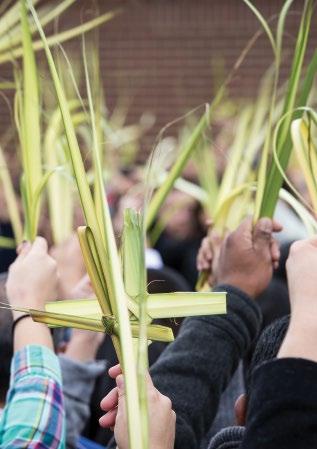
O Jesus,
Truest friend and Saviour, who laid down Your life for us, revealing the depth of Your great love for us. Your Holy face was transfigured just before You were welcomed as King to Jerusalem… only then to be brutally disfigured only days later, when You laid down Your life to save mine. You were falsely accused, interrogated and judged –for me. You were mocked and beaten, for me. You gave every last drop of Your blood – for me.
As we enter into this Holy Week and reflect upon how far You went and how much You gave for us, help us NOT to remain hard of heart. As we walk with You this week to Calvary, help us to be moved in a response of love and gratitude. By Your wounds, may we be healed.
Amen.
Luke 23:149 (NRSVCE)
Jesus before Pilate
Then the assembly rose as a body and brought Jesus before Pilate. They began to accuse him, saying, “We found this man perverting our nation, forbidding us to pay taxes to the emperor, and saying that he himself is the Messiah, a king.” Then Pilate asked him, “Are you the king of the Jews?” He answered, “You say so.” Then Pilate said to the chief priests and the crowds, “I find no basis for an accusation against this man.” But they were insistent and said, “He stirs up the people by teaching throughout all Judea, from Galilee where he began even to this place.”
Jesus before Herod
When Pilate heard this, he asked whether the man was a Galilean. And when he learned that he was under Herod’s jurisdiction, he sent him off to Herod, who was himself in Jerusalem at that time. When Herod saw Jesus, he was very glad, for he had been wanting to see him for a long time, because he had heard about him and was hoping to see him perform some sign. He questioned him at some length, but Jesus gave him no answer. The chief priests and the scribes stood by, vehemently accusing him. Even Herod with his soldiers treated him with contempt and mocked him; then he put an elegant robe on him, and sent him back to Pilate. That same day Herod and Pilate became friends with each other; before this they had been enemies.
Gospel Reading continued
Pilate then called together the chief priests, the leaders, and the people, and said to them, “You brought me this man as one who was perverting the people; and here I have examined him in your presence and have not found this man guilty of any of your charges against him. Neither has Herod, for he sent him back to us. Indeed, he has done nothing to deserve death. I will therefore have him flogged and release him.”
Then they all shouted out together, “Away with this fellow! Release Barabbas for us!” (This was a man who had been put in prison for an insurrection that had taken place in the city, and for murder.) Pilate, wanting to release Jesus, addressed them again; but they kept shouting, “Crucify, crucify him!” A third time he said to them, “Why, what evil has he done? I have found in him no ground for the sentence of death; I will therefore have him flogged and then release him.” But they kept urgently demanding with loud shouts that he should be crucified; and their voices prevailed. So Pilate gave his verdict that their demand should be granted. He released the man they asked for, the one who had been put in prison for insurrection and murder, and he handed Jesus over as they wished.
As they led him away, they seized a man, Simon of Cyrene, who was coming from the country, and they laid the cross on him, and made him carry it behind Jesus. A great number of the people followed him, and among them were women who were beating their breasts and wailing for him. But Jesus turned to them and said,

“Daughters of Jerusalem, do not weep for me, but weep for yourselves and for your children. For the days are surely coming when they will say, ‘Blessed are the barren, and the wombs that never bore, and the breasts that never nursed.’ Then they will begin to say to the mountains, ‘Fall on us’; and to the hills, ‘Cover us.’ For if they do this when the wood is green, what will happen when it is dry?”
Two others also, who were criminals, were led away to be put to death with him. When they came to the place that is called The Skull, they crucified Jesus there with the criminals, one on his right and one on his left. Then Jesus said, “Father, forgive them; for they do not know what they are doing.” And they cast lots to divide his clothing. And the people stood by, watching; but the leaders scoffed at him, saying, “He saved others; let him save himself if he is the Messiah of God, his chosen one!” The soldiers also mocked him, coming up and offering him sour wine, and saying, “If you are the King of the Jews, save yourself!” There was also an inscription over him, “This is the King of the Jews.”
One of the criminals who were hanged there kept deriding him and saying, “Are you not the Messiah? Save yourself and us!” But the other rebuked him, saying, “Do you not fear God, since you are under the same sentence of condemnation? And we indeed have been condemned justly, for we are getting what we deserve for our deeds, but this man has done
nothing wrong.” Then he said, “Jesus, remember me when you come into your kingdom.” He replied, “Truly I tell you, today you will be with me in Paradise.”
It was now about noon, and darkness came over the whole land until three in the afternoon, while the sun’s light failed; and the curtain of the temple was torn in two. Then Jesus, crying with a loud voice, said, “Father, into your hands I commend my spirit.” Having said this, he breathed his last. When the centurion saw what had taken place, he praised God and said, “Certainly this man was innocent.” And when all the crowds who had gathered there for this spectacle saw what had taken place, they returned home, beating their breasts. But all his acquaintances, including the women who had followed him from Galilee, stood at a distance, watching these things.
“In the secret of my heart, teach me wisdom” (Psalm 51:6)
You are invited to take 3-5 minutes to silently re-read the passage you have just heard. We encourage you to underline one or two things from the passage that stood out to you. Feel free to write down – for yourself and no one else – anything new or insightful that the Lord might have placed on your heart to ponder. No matter how plain or simple or deep or profound these thoughts may be, take one more moment to thank Jesus for His word to you before returning to the group.
Fr Alex Peter Selvaraj MSFS Administrator Parish of Wyoming
Palm Sunday, also known as Passion Sunday, marks the beginning of Holy Week and focuses on the Passion of Jesus. It also marks His triumphal entry into Jerusalem to His solemn embrace of betrayal, trial, and crucifixion. The term “Passion” comes from the Latin word passio, meaning “suffering,” and refers to the intense physical, emotional, and spiritual suffering Jesus endured out of love for humanity.
The liturgy of Palm Sunday has much to offer us. Am I merely an observer, or am I a participant in the procession? Do I truly understand the meaning of holding the branches? Do I sincerely mean what I sing when I proclaim “Hosanna”? Do I grasp the significance of the absence of candles, incense, greetings, and the singing of the Gospel book during the proclamation of the Passion reading? Though there are many aspects to reflect upon, let us focus this year as Pilgrims of Hope, making the procession more meaningful and practical.
Palm Sunday procession is far more than a mere ritual; it is a profound act of faith, hope, discipleship, and re-enactment of the Gospel. Through it, we proclaim Jesus as our King and Saviour. In this Jubilee Year of Hope, the procession takes on even greater significance as
an act of spiritual pilgrimage, inviting us to walk with Christ and renew our commitment to Him.
As you join the procession, take time to meditate on how Jesus entered Jerusalem with full knowledge of His coming Passion and death, yet with resolute trust in the Father’s plan and the hope of the Resurrection. Let this same hope fill our heart. Recall the words of Romans 5:5: “Hope does not disappoint us, because God’s love has been poured into our hearts.” Allow this moment to deepen your faith in God’s promises, even amidst life’s uncertainties.
Use the procession as an opportunity to bring your hopes, struggles, and burdens before God. Before joining, take a moment to write down one prayer intention or an area in your life where you seek God’s hope. Carry it in your heart as you walk, offering it to Him with the trust that He will bring good even out of suffering. Each step we take becomes a step of surrender and faith.
Walking together in the procession is a powerful symbol of unity as the Church the Body of Christ. It reminds us that we are not alone in our journey of faith. As Pope Francis encourages, “Let us journey together, and we will find strength and encouragement for the road ahead.” Pray for those around you during the procession, your family, friends, parish, and the global Church. Let your steps reflect the solidarity of disciples walking with Christ.
View the procession as a microcosm of life itself, a journey with Christ through both joys and sufferings toward the hope of eternal life. Reflect on the wisdom of Saint Augustine, who said: “Hope has
two beautiful daughters: their names are anger and courage — anger at the way things are, and courage to see that they do not remain as they are.” As you walk, consider how Christ’s journey inspires you to confront life’s challenges with courage and faith.
Branches:
The branches we hold on Palm Sunday are profound symbols of faith, reminding us of both the joy of welcoming Christ as King and the call to follow Him through His Passion. As you hold your branch, remember the joy of the crowd that welcomed Jesus into Jerusalem as their King. Let the branch be a sign of the hope we have in His resurrection, as proclaimed in Revelation 7:9-10: “They were holding palm branches in their hands. They cried out in a loud voice, salvation belongs to our God, who is seated on the throne, and to the Lamb”
Just as the crowd laid branches at Jesus’ feet, lay your own joys, struggles, and hopes before Him, trusting in His care and providence. Offer yourself as a “branch” that He can use for His glory. After the liturgy, place the blessed branch in a visible spot at home, such as a prayer corner or near a crucifix. Let it serve as a constant reminder throughout the year to live with hope, trust in God, and follow Christ’s example in your daily life. These branches will be used to make the ashes for next year: ‘Remember, you are dust, and unto dust you shall return.’ These words remind us of our fragility, but also of the profound truth that Christian life is a journey of dying each day and rising
again each day. Holy Week is a special moment when we are invited to fully live out the paschal mystery—taking up our cross which will lead us to new life and the hope of resurrection!
To earn the Jubilee Plenary Indulgence, get practical with penance! Rediscover the penitential nature of Friday by giving up distractions (yes, even the scrolling on social media—yes, that includes endless cat videos). Try fasting or abstaining from superfluous consumption! You can also donate a portion of your money to the poor or support causes that protect life and help vulnerable groups—whether it’s abandoned children, the elderly, or migrants searching for a better life. (cf. Decree on the Granting of Indulgence).

1. What is it about the symbolism of palms and branches that strikes you most?
2. Consider how the same people who welcomed Jesus as King to Jerusalem with palms and branches were just days later calling for Him to be crucified. What thoughts or feelings come to mind for you? Are there little ways that you relate with the behaviours and attitudes of the people in Jerusalem that week all those years ago?
3. Was there anything that struck you whilst listening to the Gospel that perhaps has never jumped out at you before?
Peter Brown Practice Manager
Hospital Chaplaincy & Pastoral Care
CatholicCare Broken Bay
The Passion of Jesus Christ has always had a deep emotional impact on me since I was a teenager. I’m sure that I’m not alone in feeling this way. The Gospel stories of Jesus’ betrayal, persecution, suffering and death are extremely traumatic and certainly highlight His human vulnerability in the face of the terrible inhumanity which was demonstrated by the perpetrators of the violence inflicted upon him. I’ve reflected on this from several different perspectives throughout my career in education and hospital chaplaincy.
As a history teacher I’ve investigated the use of crucifixion as a form of capital punishment throughout the Roman Empire. The brutality of nailing a criminal to a timber cross by their hands and feet to hang was specifically designed to inflict a slow, torturous death upon them. It was intended to be a very public and humiliating ordeal which would provide a deterrent to those who were witness to it. Jesus’ crucifixion as a ‘criminal’ under Pilate and Herod (with the support of the chief priests, the leaders, and the people), focuses my attention on the injustice and the irony of such cruel treatment being imposed upon such a gentle, peace-loving man.
As a Religious Education teacher, I’ve contemplated the significance of the mystery of Jesus Christ, fully human and fully divine, and how this mystery relates to His Passion. Our belief that God the Father sent us his only begotten Son to become man speaks to me of love and sacrifice. Jesus walked among us and taught us about the love of God and his Kingdom, yet He sacrificed his life so that we would come to understand the pinnacle of our faith, the Resurrection, and eternal life.
We know that in the lead up to his Passion, in the Garden of Gethsemane, it is Christ in his humanity who pleads with his Father to “take this cup of agony away from me”. Despite this plea, Jesus bravely carries out his Father’s will for our sake. Every year during Holy Week, I reflect on this manifestation of Jesus’ love and bravery by playing the beautiful song titled This Is Your Way by my sister, Monica Brown, which features a reference to the line from John 15:13, “No greater love than this, than to lay your down your life for a friend” (https://www. youtube.com/watch?v=c141QAa19-0)
As a Pastoral Care Practitioner at Gosford Hospital, I am privileged to witness and sense the practical impact that the Passion of Jesus has on people of faith who are dealing with anxiety, illness, suffering, death and grief. It is the belief and knowledge that, like Jesus, beyond their fear and trauma, there is always the promise of hope in the Resurrection. This hope is not only comforting for patients, but also for their families/friends /carers, and even hospital staff members, who rely on their faith in Jesus Christ to bring some meaning to their human anguish.
1. What struck you most from the experiences and reflections that Peter has shared in the story above? Do you find yourself relating with anything in particular?
2. Is there a particular aspect of the Passion account that you feel drawn to focus on more than the others this Holy Week? What about it touches you most?

3. Peter talks about the sacrificial nature of what Jesus did for us out of love. Think about your participation in the baptismal priesthood. If Jesus is our model, and he laid down his life for us, what are some of the things in your life that you can “lay down” freely for love of Jesus?

Eternal Trinity, Your gift to us is total. Father, You sacrificed your only Son. Jesus, You laid down Your life and suffered unspeakable indignities that our lives be spared, that we may be raised up as Your sons and daughters by covenant. Holy Spirit, You have accompanied us ever since, helping us to respond to the totality of this gift. As we enter this Holy Week and contemplate the mysteries through which You brought about our redemption, move each one of us with a deeper love for You and a greater longing for eternity with You. Let Your love for us, and our love for You, change the way we live.
For the sake of His sorrowful Passion, have mercy on us, and on the whole world.
Amen.
Palm Sunday is the final Sunday of Lent, and is known both as Palm Sunday and as Passion Sunday, because of the two main characteristics of this celebration that make it different to other Sundays:
i. the Palm branches held by members of the congregation for the solemn procession into the Church, commemorating the procession of Our Lord into Jerusalem at the start of Holy Week; and ii. the long Gospel reading of the passion and crucifixion of Our Lord that occurs on this day.
As we commemorate the Lord’s Passion, in this celebration the Churches decorations and clergy vestments will be in the colour of red.
In the Diocese of Broken Bay, the Chrism Mass is held on Tuesday of Holy Week. This can vary from Diocese to Diocese. This is where the blessing of the Oil of the Sick and the Oil of Catechumens, and the consecration of the Chrism, are carried out. During this Mass the clergy renew the commitment to ministry made at ordination. Each priest carries back to his parish some of the Holy Oils for use over the year that follows. Oils from the previous year are
disposed of ritually. One of the most popular ways of doing this is soaking cotton balls in the old oil, and adding them to the bonfire that is burning at the beginning of the Easter Vigil, and from which the Easter Candle is lit.
At this Mass, the Clergy wear white.
The Sacred Paschal Triduum is the most solemn celebration of the Church’s Liturgical Year. The Triduum is a single celebration that is spread out over three days. It spans Holy Thursday, Good Friday, and Holy Saturday, beginning with the Mass of the Lord’s Supper and ending with the Mass of the Easter Vigil, which the Lectionary specifies is itself a Mass of the Sunday of the Resurrection.
If we attend each event in the Triduum, we journey from the Last Supper at the establishment of the Eucharist and the birth of the Priesthood, through the events of the Passion and Death of Our Lord, followed by the silence of the preparation of the Lord’s body for burial, and His placement in the tomb, all the way through to sundown at the end of Holy Saturday.

When you enter the Church on the evening of Holy Thursday, it will look different to the Lenten decorations we have been used to seeing for the past six weeks. This evening, we commemorate the Institution of the Eucharist at the Last Supper, and in turn, the ministerial priesthood, therefore purple will be replaced with white and gold. The Crucifix and statues around the Church may be covered and the tabernacle will be empty. This evening all should receive Eucharist consecrated at this Mass, and enough is consecrated for the distribution of Blessed Sacrament on Good Friday.
After the Homily, a selection of parishioners who have been chosen prior to the Mass will come forward, and the Presider for that Mass, will wash their feet as a remembrance of what Jesus did for the Apostles at the Last Supper. After this the Mass will continue as usual, but upon concluding the Prayer after Communion, The Lord, present in the Blessed Sacrament, will be carried in procession to a place, often outside the Church, and placed upon what is called “the Altar of Repose”. Dismissal does not take place Instead, the members of the faithful will be invited to remain and pray in silent adoration – to “watch and pray”.
At the end of this service, the altar is stripped of all cloths and decorations. Any further uncovered Crosses, statues or paintings, are removed or covered.

This celebration occurs at 3pm because traditionally, that was the hour at which Jesus died on the Cross. When you enter the Church on Good Friday, the sparseness created from the stripping of the Altar the evening before will be very obvious, including an open tabernacle, a bare Altar and empty Holy water stoops. The proceedings of Good Friday are a continuation of what began the night before. There is no concluding Rite or dismissal at the Mass of the Lord’s Supper, likewise there is no introductory Rite at the beginning of this service.
When the Presider enters, he proceeds to the Altar in silence, wearing red vestments, and makes a full prostration before the Altar, during which the congregation kneels. A famous reading from Isaiah about “the Suffering Servant” is read with its psalm, prophetically announcing the Passion of Our Lord. The second reading from the Letter to the Hebrews is a selection that speaks about Jesus as the great High Priest. The Gospel of the day is the Passion of Our Lord according to John. After the Liturgy of the Word is complete, there are a series of Solemn
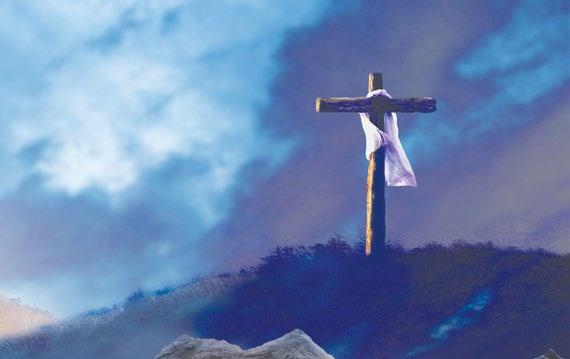

Intercessions for particular intentions – for the Church, for the Pope, for all of the Faithful, for Christian Unity, for the Jewish People, for those who do not believe in Christ, for those who do not believe in God, for those in Public Office, and for people suffering everywhere.
Following the Solemn Intercessions, the Veneration of the Holy Cross takes place. A procession with a single, covered Cross occurs, where the wood is uncovered gradually as it approaches the altar. Each member of the Faithful is given the opportunity to process to the front and make a private act of love or veneration. The Lord’s Prayer is prayed, and Holy Communion follows, with the hosts that were consecrated at the Mass of the Lord’s Supper. At the conclusion of the solemn celebration, the Faithful leave the Church in silence. Once again, there is no Concluding Rite, as sign that this journey has not ended.

The Easter Vigil is an ancient tradition of the Church. Though this celebration is the longest in the Church’s year, it has been shortened in recent times. The Faithful used to keep vigil all through the night until daybreak on Easter morning! The Vigil commences with the Ceremony of Light known as Lucernarium, outside the Church around a bonfire. The Vigil may not commence until it gets dark, and the Easter Candle is prepared then lit from the bonfire. Every member of the congregation is provided a taper or small candle. The source of the light in all the individual candles has as its origin the lit Easter Candle.
Upon entering the Church, all the lights are off and the Easter Proclamation, also known as the Exsultet, is sung, with only the light of the Resurrected Christ symbolized in the candlelight present. The selection of Readings that follows from the Old Testament recounts some of the key moments in Salvation History, contextualising our need for Salvation and God’s steadfast love for His people. At the conclusion of the Old Testament Readings, the Gloria is sung with the inclusion of bells for the entire duration of the Gloria, and all the lights come on! The New Testament Reading, Gospel and Homily then take place. If there are candidates for Baptism or Reception into the Church, the Rites for Baptism and Reception follow the Liturgy of the Word. Even if there are no candidates for Baptism/Reception, the Litany of the Saints is sung, the Baptismal water is blessed, and all members of the Faithful renew their Baptismal Promises. All the Holy Water stoops are refilled with water from the Baptismal Font at this time. The Liturgy of the Eucharist occurs as it would in a usual Mass.
This is the most solemn celebration of the Church’s Liturgical Year, and the decoration and Vestments reflect this with vibrant white and gold. This com pletes the celebration of the Triduum.
The Easter Sunday Mass is a different Mass to the Easter Vigil the evening before, with distinct Readings and Prayers. This is a little different to what we are used to during regular weekends, where the Saturday Vigil Mass is the same as the Masses that occur on the Sunday that follows.

Earlier in the history of the Church, the Easter Saturday Vigil extended all the way through the night until daybreak on Easter Sunday morning. In more recent memory, the liturgy was divided and shortened to the point where we now celebrate a Mass of typical length on Easter Sunday morning.
While you have already met your Easter Mass obligation if you attend the Saturday night Easter Vigil, this additional Easter Sunday Mass is a beautiful way to complete the liturgical celebration of the first Sunday of Easter. If you are unable to attend the additional Mass, it can be a lovely practice to look up the readings for that Mass and to spend some quiet time with them.
The Paschal Mysteries (the passion, death, resurrection and ascension of Our Lord) are the most significant series of events in history, and the Resurrection is their crescendo. Therefore, Easter isn’t celebrated on a single day, or even just the long weekend that we are so lucky to have here in Australia. Easter spans an Octave, that is, eight days! Easter Sunday is considered the high point, but the celebration extends every day up until – and including – the following Sunday, which is called “Low Sunday” though Low Sunday is also now known as Divine Mercy Sunday.
In 2025 the Christian Churches will celebrate Easter on the same day! Most years, there are different dates for Easter; the Roman Catholic and most Eastern Catholic churches, along with most Protestant churches, take the Gregorian Calendar as their basis for calculating the Easter date. The Orthodox churches and some Eastern Catholic and Protestant churches have retained the Julian Calendar.
In the Jubilee Year of 2025, both calendars providentially align!

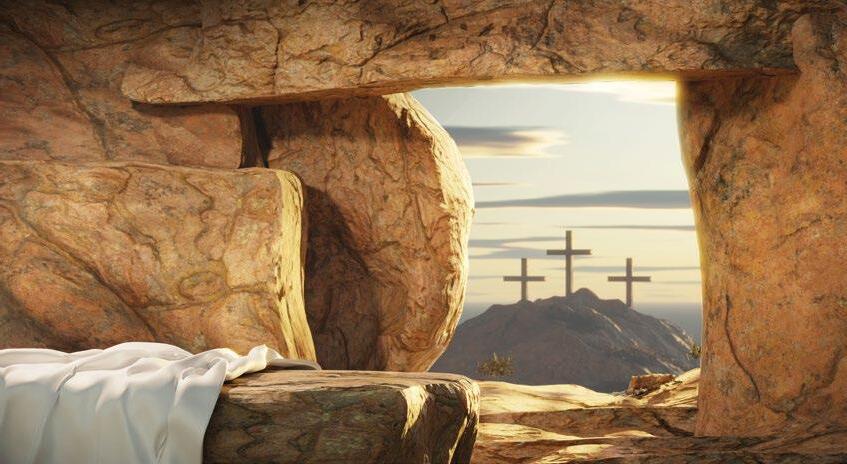

Nihil Obstat: Rev Dr John Hill
Diocesan Censor 18 February 2025
Imprimatur: Most Rev Anthony Randazzo DD JCL
Bishop of Broken Bay 21 February 2025

Copyright © 2025 Catholic Diocese of Broken Bay Scripture quotations from New Revised Standard Version Bible, copyright © 1989